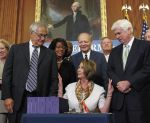by David Espo
WASHINGTON (AP)—Far-reaching legislation aimed at reining in Wall Street marks the latest and likely the last major achievement by President Barack Obama and the Democratic-controlled Congress, an 18-month partnership that strove simultaneously to fix a battered economy and enact sweeping changes to health care, education and more.
Whatever the longer term impact—the most far-reaching changes in the health care legislation won’t start until 2014—the immediate aftermath is unemployment that scrapes double digits and deficits far deeper than Obama and his allies inherited in January 2009.
The Republicans who worked ceaselessly to thwart the president’s agenda are emboldened, while Democrats who voted it into law brace for majority-threatening election losses.
“Did they do the right thing for the public interest? I think so, but that depends on your values,” said James Thurber, professor and director of the Center for Congressional & Presidential Studies at American University. “You are elected, you get power, you govern and you change things the way you said you would.”
That doesn’t mean you’ll be rewarded.
“They’re going to get punished for it,” Thurber said, in part because the economy has not responded strongly, but also because midterm elections are rarely kind to the party in control of the White House.
That’s the long view—the political pendulum swings—a perspective rarely if ever in fashion in Congress and certainly not in the run-up to an election. It also masks a perennial debate about the proper role of government in the economy, in health care, in the auto industry, in energy policy and other areas.
“If we had health care sooner, if we had energy sooner, if we had the education bill sooner, they were all three pillars of job creation, and that would have resulted in more jobs created by now,” Speaker Nancy Pelosi said at a news conference on July 15. The 2009 economic stimulus legislation has created or saved 3.6 million jobs, she added, using an estimate that Republicans challenge.
“Without it, we would never have dug out of the deep recession that the Bush administration had taken us in,” Pelosi said.
It was anything but an apology for the policies she, Senate Majority Leader Harry Reid and others have pursued relentlessly, but something of a lament that the Senate can’t act as quickly as the House. Frustrated, House Democrats compiled a list of bills that they have cleared but still await action in the Senate. It runs to 345 items.
Not surprisingly, there are far fewer if-onlys at the moment among Republicans, politically ascendant after losing seats in two straight elections.
“In every case, the administration saw a crisis and used it to achieve some other long-desired goal of the left. And the crisis remained,” Sen. Mitch McConnell of Kentucky said in a speech a few hours before the financial regulation bill won final approval.
McConnell, Boehner and nearly all fellow Republicans voted against that bill, as well as the other major measures that Obama, Pelosi and Reid pushed to passage: The $787 billion economic stimulus bill; the $1 trillion health care measure designed to extend coverage to millions who now lack it; the more generous student loans made possible by stripping banks of their lucrative role as lending middlemen.
A separate measure, passed in 2009, expanded health care for children of lower and middle-income families.
After eight years of a Republican presidency, the Democrats pursued numerous other priorities over 18 months.
Obama signed legislation giving the Food and Drug Administration authority to regulate advertising, marketing, and manufacturing of tobacco products. Another bill overrode a Supreme Court ruling, strengthening the rights of women and others who allege they were victims of discrimination on the job. Democrats also enacted hate crime legislation.
With less than four months remaining until the elections and a lame-duck session of Congress likely this fall, Obama is on track to win confirmation for Elena Kagan to the Supreme Court, his second pick in two years. An extension of unemployment benefits is all but certain. Democrats hope to overturn the Pentagon policy against homosexuals serving openly in the military.
Reid intends to seek passage of a slimmed-down energy bill that includes greater liability for BP in the oil spill in the Gulf of Mexico. But even if it passes, it will fall far short of the sweeping plan Obama outlined to control carbon emissions. That’s one of the 345 stalled measures on the House list, and one that some rank and file moderates would like to have back.
Democrats may also yet attempt to roll back tax cuts from the Bush era that benefit those at the highest income levels.
For the most part, though, the major legislative record is complete for Democrats who took office 18 months ago.
But not the argument.
“I think it ought to be repealed,” House Republican Leader John Boehner of Ohio said of the financial legislation, even before it had cleared. The bill “gives far too much authority to federal bureaucrats to bail out virtually any company in America they decide ought to be bailed out,” he added.
Obama rebutted from the White House. “We can’t afford another financial crisis, just as we’re digging out from the last one.”
